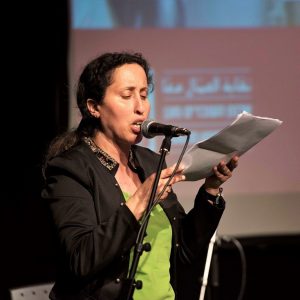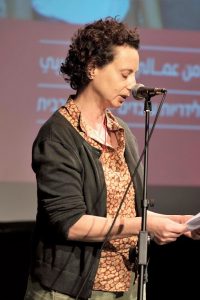[:en]
April 27th: As the crowd gathered in the hall of Beit Mazia in Jerusalem to celebrate May Day it became clear that dozens of Palestinian workers from the Zarfati Garage are late to arrive. The workers who were the center of the event were held up at a checkpoint in the entrance to Israel. It took an hour until they arrived finally in what could be seen as an educational experience for Israelis, who had tasted what thousands of workers go through each day at the checkpoints. When the Zarfaty workers entered the hall, the crowd greeted them with applause which reflected respect and admiration for their struggle and achievement.
Palestinian garage and carpentry workers sat in the theatre hall beside art teachers, musicians, agricultural workers and cleaners, Jews and Arabs, Israelis and Palestinians. The evening was led in Hebrew and Arabic by the theatre writer and director, Guy Elhanan and Hanan Manadreh Zoabi, WAC’s Chairwoman, who invited various musicians and speakers onto the stage.
Elhanan is currently running a play in Arabic which he wrote and directs, on work accidents in the construction industry. The play, produced in collaboration with WAC, is called “Above and Below the Scaffolding.” In her opening speech Hanan Zoabi explained that this Labor Day doesn’t just celebrate solidarity between Palestinian and Israeli workers, but also solidarity with human beings in their struggle for democracy, freedom and human rights. We especially stand by the struggle of the Syrian people against the bloodthirsty regime of Bashar Assad.
The evening began with opera tenor Yotam Cohen, accompanied by pianist Yossi Mar Haim from Musrara College, who offered together a moving rendition of a song from the Threepenny Opera, written by Bertolt Brecht with music by Kurt Weill. (to the youtube)
Rania Salah, WAC’s woman coordinator from East Jerusalem, spoke of her daily work in the struggle against poverty and the exploitation of workers and the unemployed in the city. Erez Wagner, director of WAC’s Jerusalem office, said “In about a month, on 24 May 2017, Jerusalem will mark 50 years to the occupation that was imposed on its Palestinian residents and on the entire West Bank.” He explained that breaking down the walls through joint struggle for workers’ rights, workers’ and an end to poverty is “the way to overcome the violence in which we live, and to finally move from a reality of occupation to a reality of peace, progress and freedom.” He ended by noting the need to recreate the concept of “left” which is often associated these days with support for dictators like Putin or Assad.
There is great confusion also in Israel, “For us,” Wagner said, “the view of political activists regarding the blod-thirsty Syrian regime as progressive and worthy of support is a distinguishing line – this kind of dogmatic thinking is not and cannot be part of what we believe should be a democratic left today.”
The audience was treated to some music between the speeches, including a song by Ismail al-Dibs, accompanied by organist Ziad al-Ayoubi. Both are Palestinians from East Jerusalem who volunteered to express their support for the Zarfati Garage workers’ struggle.
They sang the well-known song of the Lebanese fishermen “Shidu al-Hima” written in the 70’s, after the murder of the workers leader in Saida, Maarouf Saad, by the Lebanese regime. This song has since become the hymn of workers’ struggles throughout the Arab world. to the youtube. The audience was greatly moved by it, and many stood up to join in. Later, al-Ayoubi was joined by Israeli saxophonist Jess Koren, music teacher at Rosh Ha’ayin, where the workers organized with WAC signed a precedential collective agreement two years ago. Together with drummer Kobi Hagoel, the trio improvised in the spirit of solidarity across walls and borders. (to the youtube)
Hatem Abu Ziadeh, head of the workers’ committee at Zarfati Garage, thanked the workers who stood by him during the struggle to organize with WAC. He reminded the audience that four years ago the Zarfati workers were employed at low wages, with no social benefits. The struggle and their membership in WAC brought real change to their employment situation. Hatem also expressed his hope that other workers in Mishor Adumim would join WAC and unionize.
Wafa Tiara, WAC coordinator for working women, came to the event together with a big group of women agricultural laborers and cleaners from the region of the “triangle” (a region consists of 16 Arab Towns and Villages inside Israel), and spoke about the struggle to increase employment opportunities for Arab women. “We women will not stand aside. We demand an equal place in all areas of life, and we intend to take this place without asking anyone’s permission,” she said. She also spoke of how precariously employed workers in China bring down wages all over the world as companies including from Israel close production lines and move them to China. This is an example – said Tiara – “why cooperation between workers and unionization strengthens all workers, while the use of weakened workers from far away weaken all workers”.
Wafa also expressed her solidarity with the Syrians who are being massacred and expelled by Assad while an indifferent world does little, and emphasized that we must identify with the struggle for freedom in other nations in order to shake off our own chains.
Artist Galia Uri spoke about her work in the NGO “Wings” guiding artists with special needs. She said it was a natural step for her and her colleagues to join WAC, firstly because many among them are employed as “service providers” with no social benefits. But also because “WAC works for solidarity in many ways, both inside and outside the Green Line, between women and men, between workers in various fields.
The people at “Wings” appreciate this approach, particularly in light of the bad winds blowing through the country. Uri concluded “We hope “Wings” guides joining WAC will broaden solidarity, to include those who find it difficult to make their voice heard, for whom each day brings great pain and struggle but also beauty.”
Atty. Amir Basha and his partners Atty. Moran Savorai and Atty. Gilad Zbideh work closely with WAC and it’s lawyer Atty. Aya Bartenstein. Basha spoke about the long and complex Zarfati case, which took hundreds of hours to handle. “In the 15 years I’ve worked as a labor lawyer, I have never seen a case in which the employer began with such a negative attitude – firing the workers’ committee head, accusing him of criminal acts, submitting complaints with the police about WAC and its lawyer – and ultimately ending with the understanding that there’s no other way than cooperation and agreement,” Basha also said he had joined WAC, and will be paying his dues, an announcement which was greeted with thunderous applause.
Kiki Keren Hos, music teacher at Jerusalem’s Musrara College, has been an activist at the workers’ committee there for seven years. She described how lately the administrative staff joined WAC, and the teachers’ steadfast support of them in their struggle. “A few years ago, together with other artists, I met Wafa Tiara and agricultural laborers from WAC’s office in Baqa al-Garabiyeh. One summer day we sat and talked, and it quickly became clear that despite our differences, we had a lot in common, and what brought us together was greater than what separated us, when our rights and freedoms cannot be taken for granted,” she said.
Ala Khatib, Kav Laoved director, focused on the struggle against work accidents in construction, in which Kav Laoved is working with WAC after particularly bad years in this field: in 2016, there were 48 fatalities and since the beginning of 2017, 11 workers have already lost their lives in construction. Khatib noted that the government refuses to invest in supervision and training to reduce such accidents, and that its decision to permit the employment of thousands of Chinese workers in this industry is liable to make the situation even worse.
WAC director Assaf Adiv closed the event emphasizing WAC’s unique character as an organization which crosses borders and walls, and said he is proud of the fact that it was the only workers’ organization in Israel that unequivocally stands by Palestinian workers against the occupation.
“We don’t buy empty slogans. The creation of a popular workers’ movement, both on the Palestinian side and on the Israeli side, is our answer to anyone who says peace cannot be made between the nations. After the failure of the Oslo Accords, which merely oiled the wheels of corruption and polarized the situation between the sides, we offer a new path for the coming together of progressive forces among the nations of the region. Therefore we identify with all our hearts with the aspirations of the region’s peoples, especially the people of Syria, to freedom and an end to the bloodthirsty dictatorship of the Assad family.
“The democratic vision to which we are committed in Israel in Palestine and the Arab world, is linked to the need to redefine the workers’ movement and the Left around the world, where unfortunately today many workers vote for nationalist and racist leaders like Trump, Le Pen and Netanyahu. Many workers in Israeli society are xenophobic and nationalist. We are not prepared to trail behind those regressive trends. On the other hand we also reject dogmatic leftism. Our effort is part wherever possible of the effort to create of a new democratic left, struggling against savage capitalism, and aspiring to build an equal, pluralistic society that embraces difference.”

Flute – Orit Guri. Percussions – Kobi Hagoel – both activists of the Rosh Ha’ayin Music Center with WAC
Flautist Orit Guri from Rosh Ha’ayin music center finished the evening with a Turkish piece, accompanied by percussionist Kobi Hagoel. Jes Koren then joined them with his saxophone. The jazz sounds of the flute, saxophone and darbuka were a fitting end to this special evening in which music without borders mingled with an encounter of solidarity among humans. (to the youtube)[:]
![[:en]Solidarity without Borders: WAC MAAN’s Labor Day in Jerusalem[:] [:en] April 27th: As the crowd gathered in the hall of Beit Mazia in Jerusalem to celebrate May Day it became clear that dozens of Palestinian workers from the Zarfati […]](https://eng.wac-maan.org.il/wp-content/uploads/2017/05/SHY_5106-620x300.jpg)










![“EMPLOYMENT OF WOMEN IN EAST JERUSALEM: BETWEEN TRACKING INTO POVERTY AND REDUCING GAPS. GOVERNMENT PLAN 3790, FOUR YEARS ON” On the fourth anniversary of Government Decision 3790 for Investment in East Jerusalem, we present a field report by MAAN – Workers Association (PDF): Since the occupation of East Jerusalem […]](http://eng.wac-maan.org.il/wp-content/themes/arras/images/thumbnail.png)
Leave a Reply
You must be logged in to post a comment.